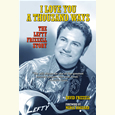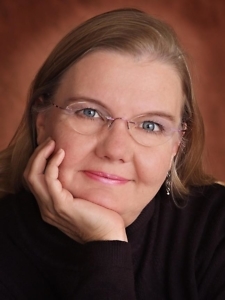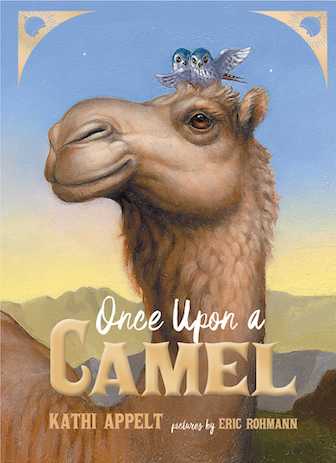Fighting a Monstrous Injustice
Historian Eric Foner talks with Chapter 16 about Abraham Lincoln’s complex views on slavery and race
Frederick Douglass was a frequent critic of the Lincoln administration. The former slave and abolitionist leader mistrusted many of Lincoln’s actions and felt the president was not moving quickly enough to end slavery, which Lincoln himself had once characterized as “the monstrous injustice.” When the two finally met, at the White House in August 1863, both Douglass and Lincoln emerged with a newfound mutual respect. Douglass commented on Lincoln’s “entire freedom from popular prejudice against the colored race.” Lincoln later called Douglass “one of the most meritorious men in America.” For the president, according to Eric Foner’s The Fiery Trial: Abraham Lincoln and American Slavery, it had been a lifelong, tortuous journey to the recognition that a black man was his equal.
On the question of slavery and race relations, Abraham Lincoln was a man of almost split personality. “Lincoln grew up in a world in which slavery was a living presence and where deeply entrenched racism and various kinds of antislavery sentiment flourished,” writes Foner. Always opposed to slavery, Lincoln nevertheless was slow to abandon the view, common among whites, that there was no place in American society for freed slaves. He often couched his remarks in terms that expressed concern for the well-being of blacks, but his words made clear his belief that the former masters and former slaves should remain separated, by law if not great distance. Although uncomfortable with some of the implications of exiling millions of people, Lincoln advocated relocating them, in his words, “to Liberia—to their own native land.” He didn’t give up on the idea of colonization until the year he met Douglass, when the valor of black soldiers convinced him that the United States belonged to freed slaves as much as to anyone else.
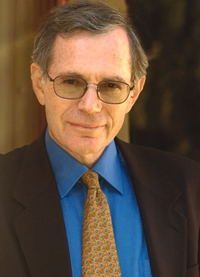 A noted expert on the Civil War and Reconstruction, Foner has produced in The Fiery Trial a political history of Lincoln as a man whose experiences ultimately led him to advocate policies he might have opposed as a younger politician. But this progression was not simple or straightforward. As Foner notes, “I think there is value in tracing Lincoln’s growth, as it were, forward, as it unfolded, with sideways and even backward steps along the way, and with the future always unknown.”
A noted expert on the Civil War and Reconstruction, Foner has produced in The Fiery Trial a political history of Lincoln as a man whose experiences ultimately led him to advocate policies he might have opposed as a younger politician. But this progression was not simple or straightforward. As Foner notes, “I think there is value in tracing Lincoln’s growth, as it were, forward, as it unfolded, with sideways and even backward steps along the way, and with the future always unknown.”
Prior to his appearance on February 23 at the University of Memphis, Eric Foner recently answered questions from Chapter 16 via email.
Chapter 16: First, Chapter 16 would like to offer belated congratulations for winning the Pulitzer, Bancroft, and Lincoln prizes for The Fiery Trial. Why is it that the Great Emancipator’s attitudes toward slavery, both personal and political, have not been subject to greater scrutiny before now?
Foner: They have, of course, been studied in many works on Lincoln, but it is remarkable how few books focus on these questions exclusively. Hard to know exactly why.
Chapter 16: Though you have previously written about Lincoln, you are recognized primarily as a scholar of Reconstruction. Was there anything about your work on post-Civil War America that particularly inspired you to explore Lincoln’s views on slavery and equality?
Foner: In fact my first book was about the Republican party before the Civil War, and I have taught the era for many years, so Lincoln has been on my mind for quite a while. But also I have felt that some recent literature has either elevated the significance of race in Lincoln’s thinking, or made him into a staunch abolitionist from day one. I felt there was still room for something new to be said on these questions.
Chapter 16: In the preface to The Fiery Trial, you note the relative paucity of Lincoln’s writings when compared with those of other presidents. Did you find it difficult to explore Lincoln’s political evolution with so little information from his own hand?
Foner: It is difficult to explore Lincoln’s inner life, which is probably more of a problem for the biographer than for a study like mine. His views on slavery and race were public and, while they changed over time, consistent at each point in his life, so the absence of private material was not much of an impediment.
Chapter 16: One of the most interesting aspects of The Fiery Trial is your explanation of the dichotomy of nineteenth-century views on slavery and racial equality. For example, you note that slavery was illegal in Illinois, but free blacks were officially discouraged from settling there. Did first-hand experience with this apparent hypocrisy help or hinder Lincoln’s efforts to deal with the political crises of the 1850s?
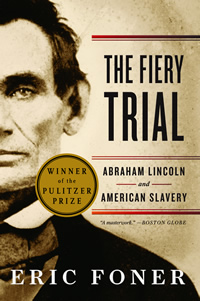 Foner: I think Lincoln knew from Illinois the virulence of Northern racism. While he shared some of the racial views of his time, he did not share this animus toward blacks. I think this made it possible for his view to grow over time. But on the other hand for many years, in part thanks to his experience in Illinois, he feared blacks would never achieve equality in the U.S. and should find a homeland somewhere else.
Foner: I think Lincoln knew from Illinois the virulence of Northern racism. While he shared some of the racial views of his time, he did not share this animus toward blacks. I think this made it possible for his view to grow over time. But on the other hand for many years, in part thanks to his experience in Illinois, he feared blacks would never achieve equality in the U.S. and should find a homeland somewhere else.
Chapter 16: During the political fights over slavery, both proponents and opponents of that institution claimed the words and actions of the Founding Fathers for their cause. Do you see parallels between that era and today’s battles over the meaning of the Founders’ words?
Foner: I suppose that every political leader or movement finds it advantageous to associate his position with the founders. Lincoln was not “wrong” in his account of their position on slavery, but he certainly offered a selective account of a very complex historical situation.
Chapter 16: You write that Lincoln’s views on the equality of blacks and whites changed significantly during his life. Is there a single event that stands out in that evolution?
Foner: I think actual contact with talented, educated black people during the Civil War affected his outlook. He had never met such people before the war. He met not only with Frederick Douglass, as is well known, as president, but many other black leaders—Sojourner Truth, Martin Delany, Alexander Crummell, Bishop Payne of the AME church, and delegations seeking the right to vote. There is no substitute for contact with people of other backgrounds for easing inherited prejudices.
On February 23 at 6:30 p.m. Eric Foner will give the Belle McWilliams Lecture in American History in the UC Theater at the University of Memphis. The event is free and open to the public.

